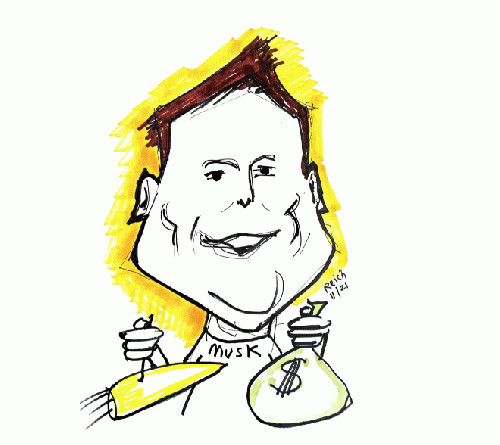Reprinted from robertreich.substack.com
Behind Elon Musk's blather about free markets, free speech, and free choice is his goal to be free from accountability
Elon Musk has put together a $46.5 billion financing package to buy Twitter - roughly two thirds of it from his own assets and a third from bank loans secured against Twitter's assets. It's the biggest acquisition financing ever put forward for one person.
Twitter's founder and top managers haven't wanted Musk to take over the company. They offered him a seat on the board but he didn't take it because he'd have to be responsible to all other shareholders. They then adopted a "poison pill" to stop him. They spent much of yesterday negotiating with him. If there's no deal, Musk said he'll buy shares directly with a tender offer that shareholders can't refuse, and then take the firm private.
After all, it's a free market.
Musk says no one should object to what he wants to do with Twitter because he's a "free speech absolutist," and who can be against free speech? Besides (he and his apologists say) if consumers don't like what he does with Twitter, they can go elsewhere. Freedom to choose.
Free market? Free speech? Free choice?
When billionaires like Elon Musk justify their motives by using "freedom," beware. They actually seek freedom from accountability. They want to use their vast fortunes to do whatever they please - unconstrained by laws or regulations, shareholders, even consumers.
The "free market" increasingly reflects the demands of big money. Unfriendly takeovers, such as Musk threatens to mount at Twitter, weren't part of the "free market" until the late 1970s and early 1980s. Before then, laws and regulations constrained them. Then came corporate raiders like Carl Icahn and Michael Milken. Their MO was to find corporations whose assets were worth more than their stock value, borrow against them, acquire enough shares to force them to cut costs (such as laying off workers, abandoning their communities, busting unions, and taking on crushing debt), and cash in. But the raiders' antics often imposed huge social costs. They pushed America from stakeholder capitalism (where workers and communities had a say in what corporations did) to shareholder capitalism (where the sole corporate goal is to maximize shareholder value). Inequality skyrocketed, insecurity soared, vast swaths of America were abandoned, and millions of good jobs vanished.
The raiders altered the "free market" to allow them to do this. That's what the super-rich do. There's no "free market" in nature. The "free market" depends on laws and rules. If you have enough money, you can lobby (bribe) legislators to make changes in those laws and rules that make you even more money. (You can also get the government to subsidize you - Musk has received a reported $4.9 billion so far.)
"Free speech" is another freedom that turns on wealth. As a practical matter, your ability to be heard turns on the size of the megaphone you can buy. If you're extremely rich you can purchase the Washington Post or own Fox News. If you're the wealthiest person in the world you can buy one of the biggest megaphones in the world called Twitter - and then decide who can use it, what its algorithms are going to be, and how it either invites or filters out big lies.
Musk said last week that he doesn't care about the economics of the deal and is pursuing it because it is "extremely important to the future of civilization." Fine, but who anointed Musk to decide the future of civilization?
(Note: You can view every article as one long page if you sign up as an Advocate Member, or higher).






